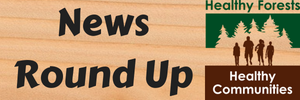By Chuck Leavell, Owner of Charlane Woodlands and Keyboardist with The Rolling Stones; and Tom Martin, former President and CEO of The American Forest Foundation
As we celebrate another Earth Day we can take pride in the conservation progress of the last half-century. Our nation is a richer, safer place with abundant wild places to appreciate. As woodland owners and conservationists we look with wonder at what our nations mosaic of forests gives us every day in a bounty of clean water, clean air, wildlife habitat, recreation and good paying rural jobs. We are thankful for all this.
However, this time of the year also brings a reminder of the looming threat of wildfires. The catastrophic wildfire seasons of today, fueled by a changing climate, run hotter, last longer and do more damage to people and nature than any time on record. These raging conflagrations are putting at risk much of the conservation progress of the last 50 years and the benefits our forest provide. They threaten communities, families, fire fighters, power supplies, businesses as well as nature. They release enormous pulses of carbon back into the atmosphere fueling further climate change.
Our challenge is to use the ethos of conservation to mitigate the menace of wildfire, to conserve nature and shield our lives and built environment. This is an especially daunting task as wildfire is a naturally occurring phenomenon, one twisted by climate change and years of unnatural suppression into a destructive force. There are some conservation principles that can let us both honor nature and protect lives.
Mimic nature. Our natural forests often have fire as a key component to its resiliency. We can use that lesson to let wildfires burn when they won’t create catastrophic damage, and when its safe, use prescribed fire to keep forests in balance. Use mechanical thinning to restore forests that have become overgrown to their heartier state with stronger trees.
Use nature’s boundaries, not property lines. Most of the forests in the US are privately owned and the largest segment of forests are owned families and individuals. Wildfire runs across all these forests. We need to make the tools of fire resiliency available to all these lands.
Respect special places. Our National Parks and Wilderness Areas have been given protected status because of the unique characteristics they have. We should continue to guard them from commerical exploitation but ensure that they are not destroyed by catastrophic wildfire or pass it along to neighboring communities.
Support sustainable systems. Consumers can make choices to buy products that mitigate climate change and wildfire. Sustainably grown wood products are more climate-friendly than plastic, concrete or steel – and can help provide markets for the wood thinnings needed to reduce risk.
Honor the people that make this possible. We have too few wildland firefighters and other forest workers and they are often underpaid for the work they do. A focus on training and recruitment is desperately needed.
Learn from the past. Knowing how forests thrived in the past has helped create a path for a more resilient future. We need an assessment and learning strategy to gather information from the evolving wildfire world, identify then quickly spread best practices as they emerge.
In recent months the Biden Administration and Congress have committed to significant future investments in addressing the catastrophic wildfire issue. This is a good step forward. But as we see in natural systems change will take time. The wildfire issue has taken decades of suppression and climate change to reach this critical state and the danger will not abate quickly. Fires will burn even as good work to mitigate them goes on.
As woodland owners and conservationists we have learned that patience isn’t just a virtue in forest management, it’s a necessity. As the wildfire season heats up again and smoke fills our skies there will be those that understandably shriek for instant solutions and those that say we can (or should) do nothing. We have learned that we can repair systems and help make them more resilient but it takes time, patience and an understanding of what nature teaches.



